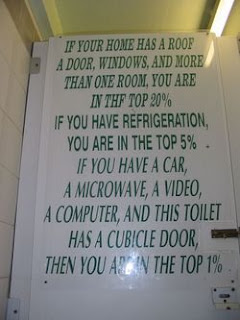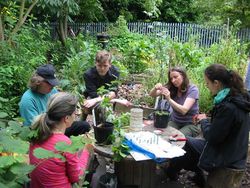St Mary Aldemary, EC4 Down the tiny streets of Watling and Bow, the young bankers in sharp suits and shiny shoes are robustly drinking beer. Everyone has spilled out of their offices onto the pavements into the warm evening. The traffic drones down Threadneedle Street where the Old Lady of the Banks presides stonily among the glass-fronted cathedrals of the financial district, the hub of the economic world, where last winter the Occupy movement changed the dance. Though you might not notice from the look of things.
In the 1920s a young American wrote a seminal poem set in London. It captured something of the unreal nature of the modern city, and the hidden mood of a people shaken by war, of a civilisation in crisis. It suggests we live in a fragmented time and only a robust spirituality will redeem us and bring our souls together.
In 2012 another American is standing in front of a packed City church and suggesting that bringing "the sacred" into the economics of our daily lives will prevent our falling into materialism and thus the destruction of the world against which every poet warns.
Datta: what have we given?
It is an eloquent and sure-footed talk and everything the man says about "living in the gift" makes perfect sense, and yet I find the true sermon downstairs in the ladies toilet at an Indian vegetarian restaurant near the Angel. Here you can eat as much as you like for under a fiver and there are lavish descriptions of the bad things that will befall you, if you don't dine on the kind of dishes they serve at the buffet. The walls are covered with visiting beauty Queens and strict admonitions to cut down on unholy meat-consumption. Or else!
I am here with Jo and our new fellow reporter, Sara. We are all knackered by the event for some reason which has yet to come to me. The whole Sacred Economics thing has yet to come to me. How do you get a black and white text to make sense within this brightly colourful fabric in which we are tightly enmeshed? In which we think of ourselves as the 99%, but in fact are amongst the most privileged?
How is it words Eisenstein uses like gratitude, service and bond feel trapping, but words like generosity and equality bring a sense of space and freedom?
Tomorrow I will go with Jo to Edible Landscapes London in Finsbury Park and find out how to graft an Asian pear on to an English apple tree. I'm en route to a conversation with Charles Eisenstein and other Transitioners on the gift economy, joining the crowd flowing across Charing Cross bridge towards the Festival Hall:
I had not thought death had undone so many.
This is not a winter dawn in the wasteland, the twilight hour in the cruel spring of post-WW1 London, it is the South Bank in summer time: a London full of people chattering on streets and lavish restaurants and glass towers, of African fusion bands and pleasure boats, a city about to split to the seams with its hosting of the Greatest Corporate Game Show on Earth. It is hard to see any fall or alienation with all this shiny matrix stuff going on. Is this the Titantic about to sink and the band playing to the max to distract us? Who are those people huddled in a windy corner outside the Hayward, listening intently for a new narrative amongst the fragments we are telling each other about our Transition lives. Are we the lifeboat, or are we fooling ourselves?
Is it our business to graft an alien spirituality onto a native tree? Or is something else going on we just haven't yet seen?
I did not come to a conclusion that day. I fell ill with a chill and have only now recovered. So this is a belated postcard. I'll let you know if I find any answers to those questions. Meanwhile enjoy this sun!
Images: with Sara in Islington: the sermon in the toilet; with Jo and the ELL crew in Finsbury Park; overlooking the demonstration bed. Lines from The Wasteland by T.S. ELiot (1922)














 Dark Mountain: Issue 20 - ABYSS is available
Dark Mountain: Issue 20 - ABYSS is available 
No comments:
Post a Comment